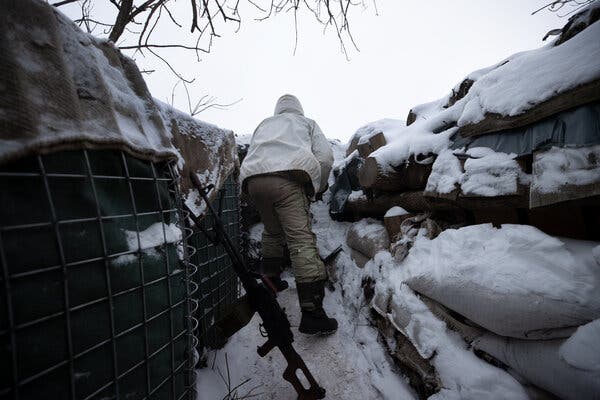
The Kremlin warned on Thursday that there was “not much cause for optimism” that the West would satisfy Russia’s demands in the showdown over Ukraine, but said that President Vladimir V. Putin would take his time to study the written responses that the United States and NATO submitted a day earlier before deciding how to proceed.
“All these papers are with the president,” Mr. Putin’s spokesman, Dmitri S. Peskov, told reporters. “There will of course be some time needed to analyze them — we won’t rush to any conclusions.”
Mr. Peskov did not discuss the content of the responses, which the United States has requested be kept confidential. But he said that based on public remarks about them by Secretary of State Antony J. Blinken and Jens Stoltenberg, the secretary general of NATO, there was little likelihood that the West would offer concessions on Russia’s central demands.
“There is not much cause for optimism,” Mr. Peskov said, replying to a question over whether Russia would be satisfied with the Western responses. “But I would continue to refrain from making any conceptual evaluations.”
Russia’s foreign minister, Sergey V. Lavrov, sounded a similarly negative note, saying in comments published on his ministry’s website that the American document contained “no positive reaction” to Russia’s main demands.
The Russian officials’ comments came against the backdrop of Russia’s troop buildup near Ukraine, and hours after a shooting at a Ukrainian missile factory overnight that served as a reminder of the fragile military situation on the ground. There was no immediate evidence that the shooting was related to the building military tensions in the region.
As Western fears grew over a possible Russian attack against Ukraine, Moscow published a list of demands last month that would involve NATO withdrawing troops from Eastern Europe and pledging never to allow Ukraine to join. Russia requested a response in writing, which the United States and NATO submitted on Wednesday.
Mr. Lavrov said that while the U.S. response included initiatives that could serve as “the beginning of a serious conversation,” there was no sign of progress on Russia’s priority of rolling back the NATO presence in Eastern Europe. He said that consultations among Russian government officials would be followed by a briefing to Mr. Putin, who “will decide on our next steps.”
Mr. Putin, who has been silent in public on the Ukraine crisis since December, visited a cemetery in St. Petersburg on Thursday to mark the 78th anniversary of the end of the Nazis’ siege of Leningrad, in which Mr. Putin’s brother died as a child. State television aired brief footage of Mr. Putin, in a black overcoat, placing flowers onto a wreath in the snow. Mr. Peskov said the president planned no other public events.
transcript
0:00/1:00
–0:00
transcript
Blinken Calls U.S. Letter to Russia a ‘Diplomatic Path Forward’
The United States delivered a written response to Russia’s demands in Eastern Europe, which included its concerns over escalating military tensions in the region.
-
Russia had previously outlined its concerns and proposals in writing. And last week, I told Foreign Minister Lavrov the United States would do the same. Today, Ambassador Sullivan delivered our written response in Moscow. All told, it sets out a serious diplomatic path forward, should Russia choose it. The document we’ve delivered includes concerns of the United States and our allies and partners about Russia’s actions that undermine security, a principled and pragmatic evaluation of the concerns that Russia has raised, and our own proposals for areas where we may be able to find common ground. We make clear that there are core principles that we are committed to uphold and defend, including Ukraine’s sovereignty and territorial integrity, and the right of states to choose their own security arrangements and alliances. We’re not releasing the document publicly, because we think that diplomacy has the best chance to succeed if we provide space for confidential talks. We hope and expect that Russia will have the same view, and will take our proposal seriously.

For now, officials on all sides say there is still a chance for diplomacy to resolve the crisis.
Senior officials from Ukraine and Russia met in person in Paris for eight hours on Wednesday in a session mediated by France and Germany. President Volodymyr Zelensky of Ukraine on Thursday described the talks as a positive development, but emphasized the importance of adhering to the cease-fire in the eastern Ukraine region known as the Donbas, where violence occasionally flares in a long-simmering conflict between Ukrainian forces and Russian-backed separatists.
“For our country, the first priority at this moment is achieving a stable and unconditional quiet in the Donbas,” he said in a statement.
A Russian Foreign Ministry spokesman, Aleksei Zaytsev, said another meeting scheduled to take place in Berlin in two weeks could identify “solutions to problems that have been piling up for seven years.” And he reiterated Russian officials’ insistence that their country had no plans to attack Ukraine.
“We see it as unacceptable to even think about war between our peoples,” Mr. Zaytsev said, according to the Interfax news agency.
But analysts say it is very likely that Mr. Putin’s diplomats do not know what, exactly, their president is planning. The Kremlin is seeking to rewrite Europe’s post-Cold War order to give Russia a sphere of influence in Eastern Europe — something that Mr. Putin says is critical to Russia’s long-term security. Mr. Putin has threatened unspecified “military-technical” measures if the West does not accede to Russia’s demands.



